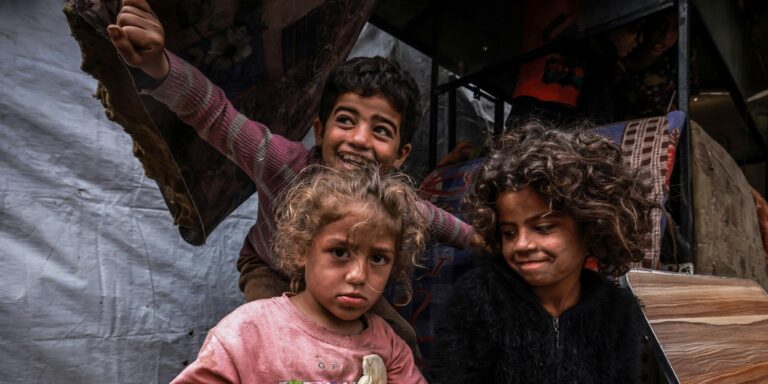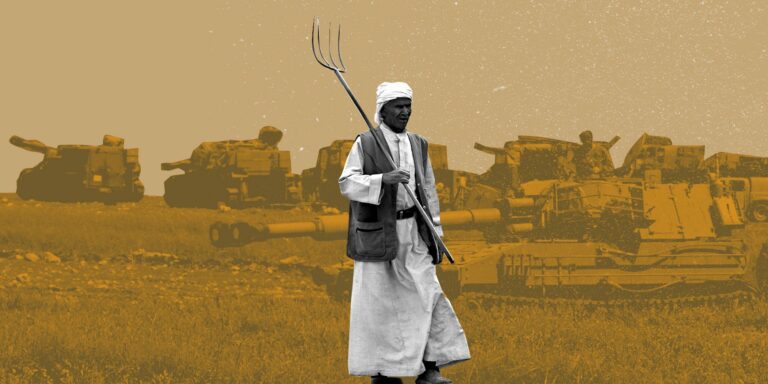We understand now that life will never be as it used to be.
We have to accept that we cannot leave our homes whenever we wish, and that we have to maintain a safe distance from others. We’ve excluded ourselves from the streets, and found that army personnel now have the right to stop wanderers and force them back home, even sometimes imprisoning them.
We are forced, intensely and quickly, to adjust to living with death hovering above our heads, while trying to absorb the impact of this incredibly heavy health emergency on our daily lives, actions, relationships, and on our way of life, most critically to our already lacking freedoms, which are now being robbed of us rapidly under the pretext of limiting the spread of the epidemic.
The streets are filled with many army and security elements, so that there is no wandering, gathering, meeting, electronic privacy, protests nor criticism.
We watch as the casualties and victims around the world increase, and with it the supposed protection measures increase, including imposing curfews, restricting gatherings, monitoring online pages and profiles, and arresting and imprisoning those who argue against facts and treatments.
The problem is that we may not be paying attention to the rights we are forsaking in our quarantines until it is too late.
Is treatment going to be more expensive than the pandemic?
With a speed almost exceeding the spread of the virus, many authorities and governments took advantage of the “Corona” opportunity to pounce on hard-earned gains that took immense sacrifices, and proceed to undermine them.
Suddenly we were excluded from the public spaces and prevented from protesting and demonstrating; Activists who had prominent roles in confronting the failure or shortcomings of their governments have again found themselves prosecuted once again.
In Lebanon, under the pretext of the epidemic, the protesters’ tents were burned in downtown Beirut, and the activists, who had tried to protest against the banks’ continued confiscation of depositors’ money, were arrested. Under the umbrella of the Coronavirus, dam deals soaked with suspicions around financial and environmental corruption were passed, and multiple quota assignments and outsourcing contracts were activated.
In Algeria, the regime tightened its grip on civil society, which had been active during last year’s demonstrations, through affirming their prison sentences, which associations described as “settling accounts with the independent press.”
In Morocco and Jordan, there have been widespread arrests and imprisonments of people who did not abide by the quarantine rules, and severe fines were implemented.
In Tunisia, restrictions are imposed on the coverage of the cases of the epidemic, and under the pretext of combating false information, some attempts have been made to pass a draft bill that excessively criminalizes publishing fake news, which also carries terms that allow for infiltration to prevent objection and undermine freedoms.
In Egypt, there is no accurate information about the extent of Corona’s spread, and it wasn’t until the British newspaper “The Guardian” published a report claiming that the official figures published by the authorities are inaccurate and that the numbers were a lot higher, that it was announced that the newspaper’s correspondent had been expelled from Egypt.
Similar actions were taken by the Iraqi authorities against “Reuters”, after the agency questioned the number of Coronavirus cases announced by the authorities, which led to the suspension of the agency’s license for months. In Turkey, journalists were imprisoned, including those who criticized the inadequacy of treatments to contain the pandemic. As for the state of prisons and prisoners, that story has escalated with urgency, with information on new cases in prisoners in more than one country in the region, especially in Egypt, Saudi Arabia and the United Arab Emirates.
Parallel to the blackout and restrictions, media authorities have been active in spreading more myths, so “doctors” in Egypt emerged on state TV channels talking about the effects of the famous Egyptian bean dish (“Foul”) in strengthening immunity, and praising the government’s efforts in eliminating the virus.
In Syria, the Minister of Health announced that the Syrian army was able to eliminate the virus, and there is no precise data about the extent of the spread of the virus.
In Saudi Arabia, where the percentage of infection is the highest among Arab countries, the regime has re-employed loyal Islamic clerics to bless and support, in the name of religion, the quarantine procedures and keeping people away from mosques.
In most countries, the voices of intimidation are loudly ostracizing immigrant workers, refugees, and expatriates, and the public discourse was flooded with misleading accounts and superstition, alongside a lot of hatred, incitement to discrimination, and a very little correct information.
It is easy to build an emergency authority, but very difficult to dismantle it. This is what happened way before the virus in Syria and Egypt, where emergency laws were announced and have been in effect decades.
The examples are endless, as governments in our countries have long considered transparency a weakness, and facts and information published are dealt with as if they were a threat to national security, as if the information about the true number of victims of infection was some sort of a personal attack, rather than a health crisis that the entire globe is trying to contain. In our countries we pay double the price after our regimes have broken records in corruption, in order to find ourselves in light of the epidemic in front of the worn out health systems that are not qualified to absorb the disaster that befell us.
Quarantine, Arrests and Imprisonment
Citizens who are concerned about their health, safety and economic situation, are demanding protective measures in the countries ravaged with corruption and authoritarianism. The virus has already managed to overwhelm medical services, halt flights, and eliminate economic growth, but perhaps one of its deadliest effects was spreading during a political era where authoritarian regimes are more powerful than ever.
Leaders around the world have issued emergency decrees and legislation that have served to expand the scope of their authority. Will they give up those powers when the epidemic is contained?
Globally, everyone has fallen into this trap of exceptional measures. In Hungary, a new law granted Prime Minister Viktor Orban enormous powers, and in Chile the army was sent to the public squares that had been occupied by protesters not too long ago. In Bolivia they’ve postponed the elections, and the President of the Philippines has threatened to shoot at those who violate the quarantine rules.
In our region, squares that were filled with protesters in Lebanon, Iraq and Algeria now appear calm and completely empty; The virus has frozen the will of the demonstrators and spread terror amongst the opposition, who have since retreated, after rocking the region immensely the past few months.
It’s the ideal time for weak and corrupt governments to do whatever they want to seek more power, while their citizens are spending their time and effort searching for protection, medical care, security as well as coping mechanisms to deal with self-isolation.
The problem is that we may not be paying attention to the rights we are forsaking in our quarantines until it is too late, as it is not clear what will happen with the emergency laws once this crisis passes. Over time, emergency laws permeate legal structures and become the norm. It is easy to build an emergency authority, but very difficult to dismantle it. This is what happened way before the virus in Syria and Egypt, where emergency laws were announced and have been in effect decades.
Once again, the strong will snatch food from the mouths of the poor, and here we are in isolation, in the vacuum between the pandemic and authoritarianism.
Dictatorship Before the Virus
The world had already been sinking in a quagmire of authoritarian ambitions before 2020, but as the coronavirus and its devastating effects has subjected many of the planet’s residents to the risk of death, the crisis gave those leaders effective tools of repression: home quarantines, forced dependance on trackable electronic communication, as well as dependence on governmental resources and information.
The hovering emotion this time is fear, and fear is what makes people willing to bear with anything; When danger is present, some of us start to believe that authority, any authority, is the only thing that can save us. The economy has already suffered a severe blow; hundreds of thousands of people have lost their jobs, and many more will become unemployed within the coming weeks. Inequality in wealth, opportunity, and access to health care has now become more evident than it was a mere month ago.
Hundreds of millions suffer from malnutrition as a result of the unequal distribution of wealth and power. The lack of food can starve millions.
Once again, the strong will snatch food from the mouths of the poor.
And here we are in isolation, in the vacuum between the pandemic and authoritarianism.





